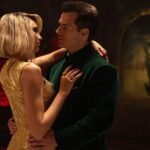


‘My Old Ass’ Review: Aubrey Plaza in a Sweet Shot of Nostalgia Mixing Romance, Comedy and a Sprinkling of Fantasy
February 3, 2024


‘Argylle’ Review: Henry Cavill and Dua Lipa Get Lost in Spy Caper’s Meta Hall of Mirrors
February 5, 2024David Schickele’s rarely seen feature stars Paul Eyam Nzie Okpokam as a version of himself, a Nigerian graduate student navigating the countercultural flowering and political fervor of 1968 San Francisco.
Bushman
Intimate, assured and dynamic.
About an hour into the brief and dazzling Bushman, the central character announces, “I need a hamburger,” and then the screen goes black for a few seconds. When the movie resumes, it’s no longer a drama enlivened by a streetwise documentary sensibility, but a work of straight-up nonfiction. Relying on stills in this last stretch but maintaining the visual fluency of the preceding story, the final 10 minutes recount why director David Schickele stopped filming for a year: He was working instead on securing a release from prison for his wrongfully imprisoned leading man.
But despite the sharp knife of injustice, Bushman is no angry screed or dispirited lament. Bursting with passion, sly humor, satirical swipes and the inescapable heartbeat of insurgency — most of the film was shot in 1968 San Francisco — it’s the life-loving tale of a wise innocent abroad, and the not exactly warm reception he receives.
It’s a sequel of sorts to Give Me a Riddle, the vibrant hourlong 1966 doc that Schickele produced and directed for the Peace Corps, after convincing the agency’s leadership that his unorthodox approach was worth a shot. They were thinking more along the lines of a clean-cut Disney version; his film, in which the wearing of beards and the consumption of alcohol by Corps volunteers are both on defiant display, bears a disclaimer that it “does not necessarily reflect Peace Corps policy.”
It’s also a compelling historic snapshot, a portrait of Nigeria’s vanguard of young adults in the years before the newly independent country would become embroiled in civil war. Okpokam is one of the four charismatic Nigerians at the center of Riddle, friends and students of Schickele when he was a Peace Corps volunteer a few years earlier. (Another Corps vet, Roger Landrum, is the director’s onscreen stand-in.) Both films end with the image of Okpokam’s smiling face, though the contexts couldn’t be more different. (Riddle, a fascinating work in its own right, will have a special screening in Seattle, in conjunction with the release of Bushman, with further theatrical possibilities in the works.)
Bushman’s Gabriel is three months into his American sojourn as the film opens. The evocative shimmer of the black-and-white cinematography by David Myers (whose subsequent credits would include Alan Rudolph’s Welcome to L.A. and Martin Scorsese’s Rolling Thunder Revue, Myers’ last film before his death) finds Gabriel walking barefoot through a desolate section of the city, his shoes balanced on his head. An opening title card sets the broader mood, reminding us that in 1968 Martin Luther King, Robert Kennedy and Bobby Hutton (a Black Panther killed by Oakland police) are among the recent dead, and that Nigeria’s civil war is in its second year.
Another source of tension for Gabriel, who’s working on a master’s in drama, is his expired work visa. He needs to find a job yet lay low, avoiding the demonstrations and clashes with police around the San Francisco State College strike, a months-long protest led by the Black Students Union and a coalition known as the Third World Liberation Front. The specifics of the campus unrest aren’t addressed directly in the main part of the movie, which, through its protagonist’s eyes, regards his new surroundings not in terms of political divisions but with an artist’s sense of person-to-person discovery.
Via voiceover and in an on-camera interview-style monologue, Gabriel talks about his upbringing: the traditional initiation rituals, the ancestral shrines, the Catholic schooling. It seems he has known all his life what it means to be between two worlds. And yet the Americans are a whole other level of strange.
A loudmouthed motorcyclist (Mike Slye) who gives Gabriel a ride demands that he “say something in African.” There’s the one-night stand with a white sociology student (Ann Scofield) whose fascination with “this natural man all at home with himself” doesn’t take long to curdle into something very ugly. There’s the rich gay man (Jack Nance), a borderline caricature “yearning,” as Schickele puts it so strikingly in his synopsis, “to be ravished by the Dark Continent.” They’re not all baddies, though; something genuine sizzles beneath the surface in Gabriel’s romance with Suzie (Timothy Near).





